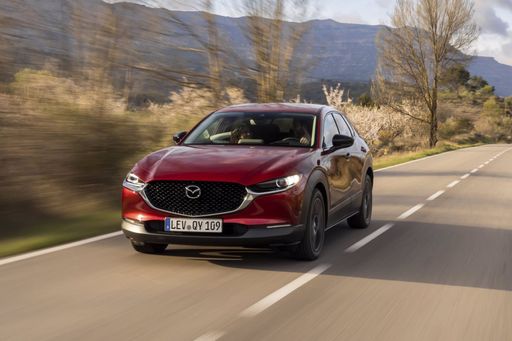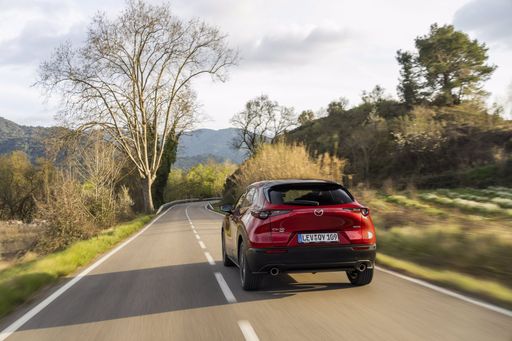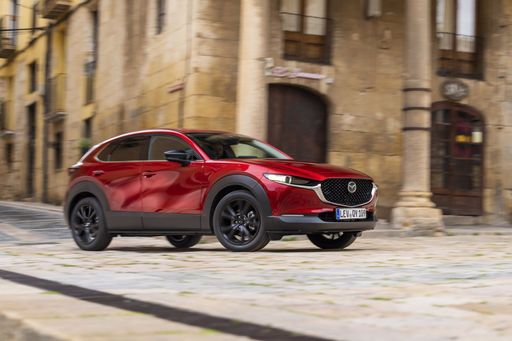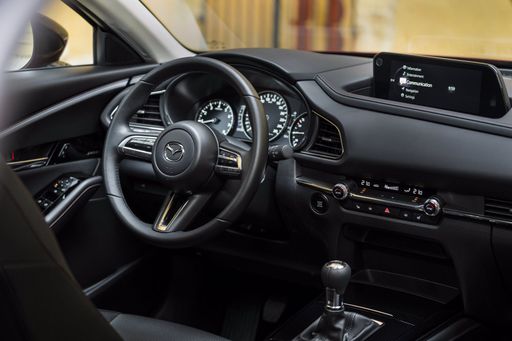Mazda CX-30 vs Toyota Yaris - Differences and prices compared
Costs and Efficiency:
Price and efficiency are often the first things buyers look at. Here it becomes clear which model has the long-term edge – whether at the pump, the plug, or in purchase price.
Toyota Yaris has a slightly advantage in terms of price – it starts at 21900 £, while the Mazda CX-30 costs 25200 £. That’s a price difference of around 3377 £.
Fuel consumption also shows a difference: Toyota Yaris manages with 3.80 L and is therefore decisively more efficient than the Mazda CX-30 with 5.70 L. The difference is about 1.90 L per 100 km.
Engine and Performance:
Power, torque and acceleration say a lot about how a car feels on the road. This is where you see which model delivers more driving dynamics.
When it comes to engine power, the Toyota Yaris has a evident edge – offering 280 HP compared to 186 HP. That’s roughly 94 HP more horsepower.
In acceleration from 0 to 100 km/h, the Toyota Yaris is decisively quicker – completing the sprint in 5.50 s, while the Mazda CX-30 takes 8.30 s. That’s about 2.80 s faster.
In terms of top speed, the Toyota Yaris performs to a small extent better – reaching 230 km/h, while the Mazda CX-30 tops out at 204 km/h. The difference is around 26 km/h.
There’s also a difference in torque: Toyota Yaris pulls distinct stronger with 390 Nm compared to 240 Nm. That’s about 150 Nm difference.
Space and Everyday Use:
Whether family car or daily driver – which one offers more room, flexibility and comfort?
Seats: offers more seating capacity – vs .
In curb weight, Toyota Yaris is evident lighter – 1090 kg compared to 1455 kg. The difference is around 365 kg.
In terms of boot space, the Mazda CX-30 offers evident more room – 430 L compared to 286 L. That’s a difference of about 144 L.
In maximum load capacity, the Mazda CX-30 performs distinct better – up to 1406 L, which is about 471 L more than the Toyota Yaris.
When it comes to payload, Toyota Yaris barely noticeable takes the win – 525 kg compared to 496 kg. That’s a difference of about 29 kg.
Who comes out on top?
Overall, the Toyota Yaris shows itself to be dominates this comparison and secures the title of DriveDuel Champion.
It convinces with the more balanced overall package and proves to be the more versatile choice for everyday use.
 @ Toyota Motor Corporation
@ Toyota Motor Corporation
Toyota Yaris
Costs and Consumption
View detailed analysis
Engine and Performance
View detailed analysis
Dimensions and Body
View detailed analysis
Mazda CX-30
The Mazda CX-30 blends sleek coupe-like lines with the practicality of a compact crossover, feeling more premium than its price tag suggests. It’s a joy to drive for anyone who likes a taut chassis and an interior that treats daily commutes like a small luxury escape.
details @ Mazda Motor Corporation
@ Mazda Motor Corporation
 @ Mazda Motor Corporation
@ Mazda Motor Corporation
 @ Mazda Motor Corporation
@ Mazda Motor Corporation
 @ Mazda Motor Corporation
@ Mazda Motor Corporation
Toyota Yaris
The Toyota Yaris is a sprightly city hatch that packs clever packaging, surprising comfort and fuel-sipping manners into a neat, easy-to-park package. It rewards sensible buyers with low running costs, friendly ergonomics and a forgiving drive, delivered with Japanese reliability and just enough personality to make errands feel a little less ordinary.
details @ Toyota Motor Corporation
@ Toyota Motor Corporation
 @ Toyota Motor Corporation
@ Toyota Motor Corporation
 @ Mazda Motor Corporation
@ Mazda Motor Corporation
|
 @ Toyota Motor Corporation
@ Toyota Motor Corporation
|
|
|
|
Costs and Consumption |
|
|---|---|
|
Price
25200 - 36800 £
|
Price
21900 - 46700 £
|
|
Consumption L/100km
5.7 - 6.6 L
|
Consumption L/100km
3.8 - 9.5 L
|
|
Consumption kWh/100km
-
|
Consumption kWh/100km
-
|
|
Electric Range
-
|
Electric Range
-
|
|
Battery Capacity
-
|
Battery Capacity
-
|
|
co2
129 - 148 g/km
|
co2
87 - 215 g/km
|
|
Fuel tank capacity
48 - 51 L
|
Fuel tank capacity
36 - 50 L
|
Dimensions and Body |
|
|---|---|
|
Body Type
SUV
|
Body Type
Hatchback
|
|
Seats
5
|
Seats
4 - 5
|
|
Doors
5
|
Doors
3 - 5
|
|
Curb weight
1455 - 1587 kg
|
Curb weight
1090 - 1356 kg
|
|
Trunk capacity
422 - 430 L
|
Trunk capacity
141 - 286 L
|
|
Length
4395 mm
|
Length
3940 - 3995 mm
|
|
Width
1795 mm
|
Width
1745 - 1805 mm
|
|
Height
1540 mm
|
Height
1455 - 1500 mm
|
|
Max trunk capacity
1398 - 1406 L
|
Max trunk capacity
935 L
|
|
Payload
458 - 496 kg
|
Payload
289 - 525 kg
|
Engine and Performance |
|
|---|---|
|
Engine Type
Petrol MHEV
|
Engine Type
Full Hybrid, Petrol
|
|
Transmission
Manuel, Automatic
|
Transmission
Automatic, Manuel
|
|
Transmission Detail
Manual Gearbox, Automatic Gearbox
|
Transmission Detail
CVT, Manual Gearbox, Automatic Gearbox
|
|
Drive Type
Front-Wheel Drive, All-Wheel Drive
|
Drive Type
Front-Wheel Drive, All-Wheel Drive
|
|
Power HP
140 - 186 HP
|
Power HP
116 - 280 HP
|
|
Acceleration 0-100km/h
8.3 - 10.3 s
|
Acceleration 0-100km/h
5.5 - 9.7 s
|
|
Max Speed
191 - 204 km/h
|
Max Speed
175 - 230 km/h
|
|
Torque
238 - 240 Nm
|
Torque
390 Nm
|
|
Number of Cylinders
4
|
Number of Cylinders
3
|
|
Power kW
103 - 137 kW
|
Power kW
85 - 206 kW
|
|
Engine capacity
1998 - 2488 cm3
|
Engine capacity
1490 - 1618 cm3
|
General |
|
|---|---|
|
Model Year
2025
|
Model Year
2024 - 2025
|
|
CO2 Efficiency Class
D, E
|
CO2 Efficiency Class
B, G
|
|
Brand
Mazda
|
Brand
Toyota
|
What drive types are available for the Mazda CX-30?
The Mazda CX-30 is offered with Front-Wheel Drive or All-Wheel Drive.
The prices and data displayed are estimates based on German list prices and may vary by country. This information is not legally binding.
